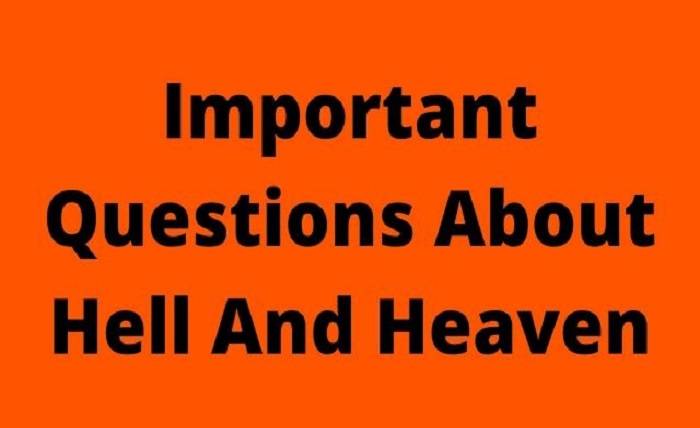Important Questions About Hell And Heaven According To The Bible?

In this post, we will know the answers to 2 important questions about Hell and Heaven.
- What does the Bible say about heaven? What do we do there?
- Are There Many Punishments In Hell?|What does the Bible say about hell?
What Will We Do In Heaven?
In Luke 23:43, Jesus declared, “Genuinely I inform you that you will certainly be with me in paradise today.” Jesus uses the word “paradise” for “paradise,” which means “a garden, that is, (specifically) Eden (a future place of joy, paradise).” Paradiso is a Greek word derived from the Hebrew word Pardes, meaning “a garden:—a forest, orchard” (Strong’s dictionary), etc. Jesus said, “You will be with me today not in “en nephele,” which means “clouds” in Greek, but in “en paradise.” The key point here is that Jesus chose the word “a garden.” and used. Not a regular garden but the “paradise of God ” or the Garden of God (Revelation 2:7) that will be a place of happiness for us in the future. Does it seem like a boring place? When you have a garden, if you think about her, do you think she is boring?
Jesus stated, “You will pray to the Lord your God, as well as pray to Him alone” (Matthew 4:10). It is interesting to note below that Jesus did not state “praise and serve.” Even a brief examination of the word praise in the Bible reveals that it refers to oral talk and that most of the space is given to singing songs. However, prayer originates from the heart. Praise materializes itself in praise. To serve God is to worship Him, and Scripture clarifies that we will certainly serve God in heaven. “His servants will offer him” (Revelation 22:3).
We cannot fully serve God because of sin in this life, but “there shall be no more a curse” in heaven (Revelation 22:3). We will no more be under menstruation of sin anymore, so all we do will be worship in heaven. We will not be motivated by anything other than the love of God. Whatever we do is out of love for God in us. Our dispositions will not be affected by sin.
So, what job will we do in paradise? There is one point that we pick up from, “That has recognized the knowledge of the Lord? Or who became his preacher?” (Romans 11:34), “in which are concealed all the prizes of wisdom as well as knowledge” (Colossians 2:3). God “who is great and perfect and everlasting” (Isaiah 57:15). God is greater than anything, and also, to understand Him calls for endless time “to recognize His breadth and length and elevation and deepness, as well as to recognize the love of Christ” (Ephesians 3: 18-19). To put it simply, we never ever stop learning.
God’s word states that we will not be alone in heaven. “At this time, my knowledge is incomplete, but at that time I will know as fully as I have been known” (1 Corinthians 13:12). This makes it seem that we will not only get to know our friends and family, but we will get to know them “totally. “In other words, there is no demand for enigmas in paradise. There’s absolutely nothing to be embarrassed about. There’s nothing to hide. We will have time for eternity with a “great crowd” that cannot be counted, who are descendants from all nations and all kinsmen and peoples and languages” (Revelation 7:9). It’s no wonder that a heaven is a place of unlimited learning. Endless time will be invested simply in getting to know everybody!
Further anticipation about what we will do in God’s eternal garden, heaven, will become all the more important when “the king will say to those on his right, ‘Come, blessed people of my Father, get ready for that kingdom. Go, which has actually been gotten ready for you from the beginning of the world” (Matthew 25:34). Whatever the hugs will do, we can be sure that it will be more amazing than imagined!
Are There Many Punishments In Hell?
The suggestion that there are different levels of punishment in Hell stems largely from The Divine Comedy, written by Dante Alighieri between 1308 and 1321. In verse, the Roman poet Virgil overviews Dante to the nine circles of Hell. In poetry, the Roman poet Virgil guides Dante to the nine circles of Hell. These chakras represent a gradual increase in wickedness, concentrating and ending in the earth’s center, where Satan is tied up. The sinners of each chakra have been punished in a manner that seems appropriate according to their transgressions. Every sinner has been taken into infinite misery as a result of the main sin he has committed. According to Dante, these cycles begin with the first chakra, starting with the unbaptized and well-characterized pagans, reaching the center of Hell, reserved for those who committed the highest sin—treason against God. Is.
Although the Bible does not claim anything particularly, it does appear to indicate that there are various levels of punishment in Hell. According to Revelation 20:11–15, the people’s works “will be judged according to what is written in the books” (Revelation 20:12). However, at this judgment, all people, nonetheless, will be thrown into the lake of fire (Revelation 20:13– 15). Therefore, the function of judgment is to determine just how severe the penalty in Hell will be. Regardless of what, being thrown into a somewhat warmer part of the lake of fire is not much consolation to those that are still blessed for endless time.
Another indication of the different levels of punishment in Hell is found in the words of Jesus: “A slave who knew his master’s will, and was not prepared and did not follow his will, will be severely beaten. Knowing not to do things worthy of being killed, he will be killed a little, so to him who has been given much, much will be demanded, and from whom much has been entrusted, much will be taken from him” (Luke 12:47–48). Regardless of how many levels of penalty in Hell, it is clear that Heck is a place to be avoided.
Unfortunately, the Bible claims that many people will go to Hell: “Go into via the narrow gateway because broad is the gate and simple is the roadway that leads to destruction, and also there are lots of who get in via it.” For narrow is the gate and also challenging is the way that results in life, as well as a couple of are those who find it” (Matthew 7:13– 14). Everyone should ask themselves, “Which path am I on?” Many “many” people on the broad road have only one thing in common—they have denied Christ as the only way to heaven. Jesus claimed, “I am the way and also the reality and the life; no person comes to the Father other than me” (John 14:6). When he says the only way, this is what he means. Everyone who follows any “path” other than Jesus is walking the path of destruction, and, whether or not there are various punishments in Hell, its suffering is abhorrent, terrible, eternal, and inevitable.




